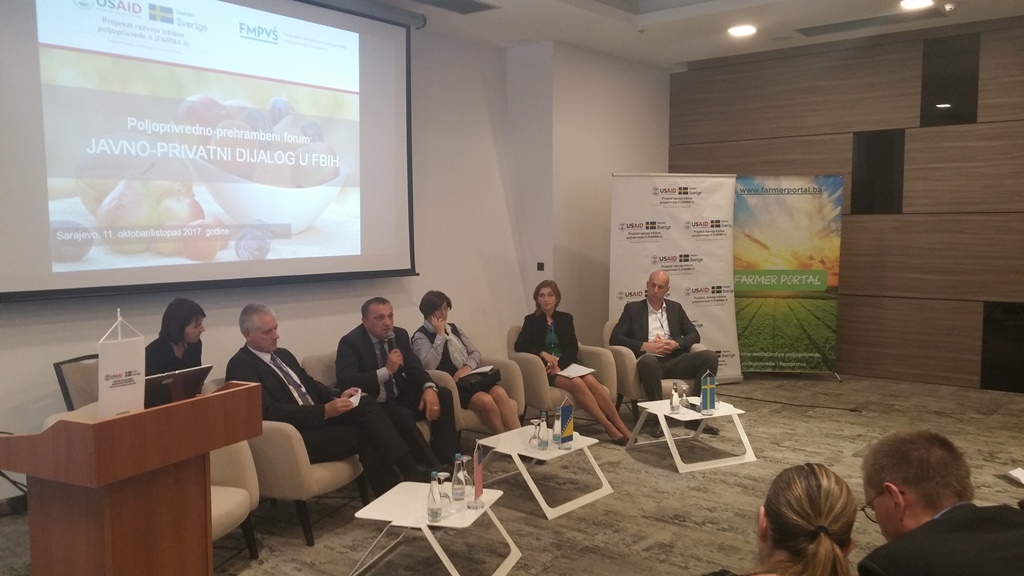Conclusions of the First Agri-Food Public-Private Dialogue Forum
The Ministry of Agriculture, Water Management and Forestry, in partnership with the USAID/Sweden FARMA II project organized the First Agri-Food Public-Private Dialogue Forum on 11th October 2017. The event gathered together over 120 agri-food professionals from both the public and private sector to discuss the main challenges and opportunities in the agri-food sector. The main objective of this first forum was to agree upon a number of discreet practical actions that could be agreed to be implemented over the next six months and other priority actions that could be initiated and continued over the next 1-2 years. To begin the process, attention was focused upon consideration of the most economically significant and most competitive sub-sectors in the Federation, namely dairy, poultry, fruit and vegetables, honey, and medicinal and aromatic plants.
Main outcomes:
- All sub-sector groups agreed to establish dedicated coordination bodies that would continue the work initiated during the Forum. These coordination bodies will include leading experts from the private and public sector and will be responsible for developing more detailed proposals and overseeing follow-up actions over the next six months. Other specific actions agreed by the specific sub-sectors included:
- Dairy: Priority actions include rapid implementation of the animal registration and identification system and the continuation of activities aimed at adopting the law on food, law on agriculture and the veterinary law at the B&H level, in line with the recommendations from the last HFAA visit – all in order to maintain the approval to export milk to the European Union; Additional focus was placed on the increase of yields in milk production through continuous education of milk producers by the joint actions of dairy processors, extension services, inspectors, cooperatives and associations.
- Poultry: Priority actions include the launch of targeted feasibility studies for the safe disposal of animal waste; organization of practical trainings for inspectors and veterinarians regarding the official sampling for Salmonella control; design and launch of targeted market research to identify new EU export markets for BiH poultry meat; design and launch of a BH Quality brand for poultry products; development of detailed proposals for regulatory harmonization and implementing acts based upon a targeted poultry sub-sector gap analysis.
- Fruit & Vegetables: Priority actions include: urgent activation of the planned funds (BAM 2.3 million) for subsidizing interest rates, from the 2017 budget, to support targeted investments; establishment of a board to coordinate planned subsidy allocation, in partnership with the ministry; In order to limit the import of low quality fruit and vegetables and to prevent the fabrication of invoice values for imported produce at the borders, which are reducing the funds collected from VAT and undermining domestic producers, detailed proposals will be prepared and presented to the B&H Ministry of Foreign Trade and Economic Relations.
- Honey/Beekeeping: Priority actions include: conducting a detailed analysis of the current laws regulating beekeeping and development of proposed changes for ministry consideration; establishment of a forum together with representatives of the fruit and vegetable sector to discuss the solutions for protection of bees from pesticide poisoning; design and completion of targeted trainings and awareness raising programs for beekeepers on bee and beehive health and protection.
- Medicinal and aromatic plants: Priority actions include: Conducting targeted market research at local level for certain product groups, to better align market supply with demand for specific products; conduct a sub-sector analysis of available quantities of wild and cultivated herbs in FB&H to guide future planning and support; launch of targeted practical and theoretical trainings for producers, processors and advisors on MAP production diversification, standardization, marketing and certification.
- Other key cross-cutting actions proposed to be implemented as a PPP include:
-
- Agricultural Land Working Group: tasked with development of proposals for amendments to the existing legal framework governing agricultural land
- Organic production Working Group: to be expanded to include other private and public sector representatives, tasked with reviewing and revising draft regulatory proposals
-
- Agricultural Financial Support Working Group: tasked with development of new proposals for regulating future financial support to the agri-food sector


